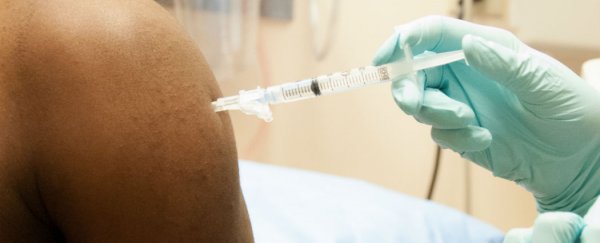Developed by British pharmaceutical manufacturer, GlaxoSmithKline (GSK), and US-based biotech company, NewLink Genetics, two new vaccines for Ebola have been deemed safe for human trials to start in West Africa in about four weeks. According to Marie-Paule Kieny, assistant director-general of health systems and innovation at the World Health Organisation (WHO), both vaccines have "an acceptable safety profile".
The death-toll for the current outbreak of Ebola has passed 8,000, with more than 20,000 infected, and teams of researchers around the world are racing to halt the progression of the virus with a new vaccine.
Late last year, GSK researchers published the results of their phase 1 trial in the New England Journal of Medicine, stating that, after having received a dose of their vaccine, 20 healthy volunteers in the US produced an immunological response. Those results were mirrored in follow-up trials carried out in the UK, Mali and Switzerland.
According to the GSK website, the formula of the vaccine incorporates a dose of a chimpanzee cold virus, called chimpanzee adenovirus type 3 (ChAd3), which delivers a small amount of genetic material from both the Sudan and Zaire strains of the Ebola virus. "Alongside this, GSK is also working on a one-strain vaccine, which focuses on the Zaire strain, prevalent today in West Africa," says Liat Clark at Wired UK. The company plans to have several million doses ready by mid-2015.
The NewLink vaccine uses a livestock virus called Vesicular stomatitis Indiana virus (VSIV) to carry the Ebola gene, and according to Clark, reportedly causes joint pain in the patient's hands and feet. But this side effect was deemed mild enough for trials to continue. He says another vaccine is being developed in the UK by Johnson & Johnson, but is still in phase 1 trials after having protected monkeys against the current Zaire strain in lab tests.
If the GSK phase 2 trials are successful in West Africa, the company says phase 3 will see thousands more volunteers be vaccinated, including frontline healthcare works in affected countries such as Liberia and Sierra Leone, and possibly Guinea.
Of course, trials like this are always going to be a little controversial, with complaints that pharmaceutical companies are exploiting their African volunteers, plus there's the fact that in every trial, several volunteers will have to act as the control group, which means they will be prevented from being vaccinated themselves for some time. "But vaccine organisers hope they've found a way to involve West African citizens without alienating them," says Richard Harris at NPR. The plan is for three countries, Guinea, Sierra Leone, and Liberia, to trial out different methods of testing to make it more fair for the volunteers.
"Guinea plans to identify 90 new outbreaks of Ebola and vaccinate people in the community where the outbreak is taking place," says Harris. "This strategy was used successfully to eradicate the last cases of smallpox."
In Sierra Leone, either the GSK and NewLink vaccine will be trialled, they haven't decided which one yet, and the vaccine will be administered to 6,000 healthcare workers and other high-risk volunteers gradually. This means the volunteers who are waiting to have their dose can act as the unvaccinated control group, but they will still get the benefits of vaccination later on in the trial.
Liberia plans to recruit 27,000 volunteers from all over Liberia, who will be randomly allocated to one of three groups - one receiving the NewLink vaccine, one the GSK vaccine, and one will be the unvaccinated control group. Martin Enserink at Science Magazine calls this method "the gold standard in drug and vaccine testing".
Trials will begin in as little as four weeks' time.
"Hopefully we will have broken the back of this epidemic by the time we've finished these trials," professor at the University of Witwatersrand in South Africa and chair of the WHO Ebola vaccine committee, Helen Rees, said at a WHO press conference. But, she added, even if these vaccines prove a success, we can't expect them to single-handedly put the threat of Ebola to bed. "We anticipate this is not going to be the end of Ebola, that we are going to continue to see sporadic cases that might become more widespread, as we've seen in this instance."
Sources: Wired UK, NPR, GlaxoSmithKline, Science Magazine
